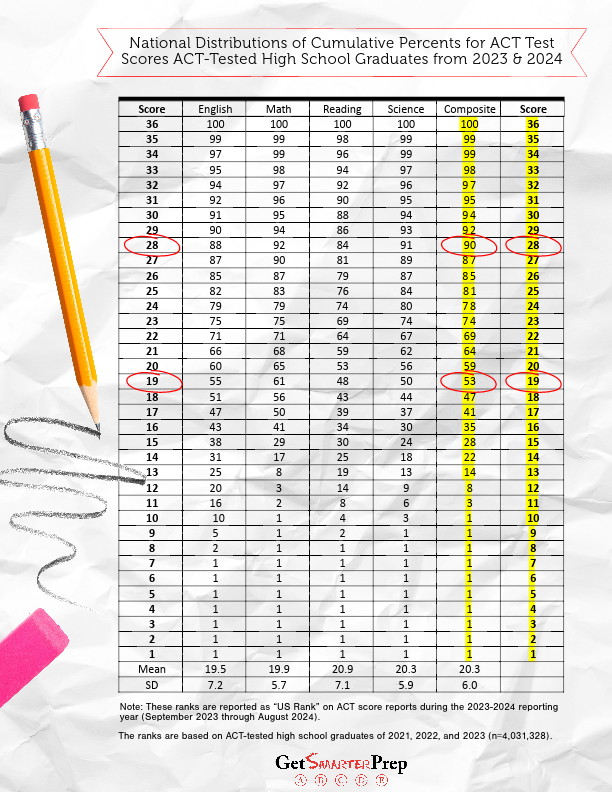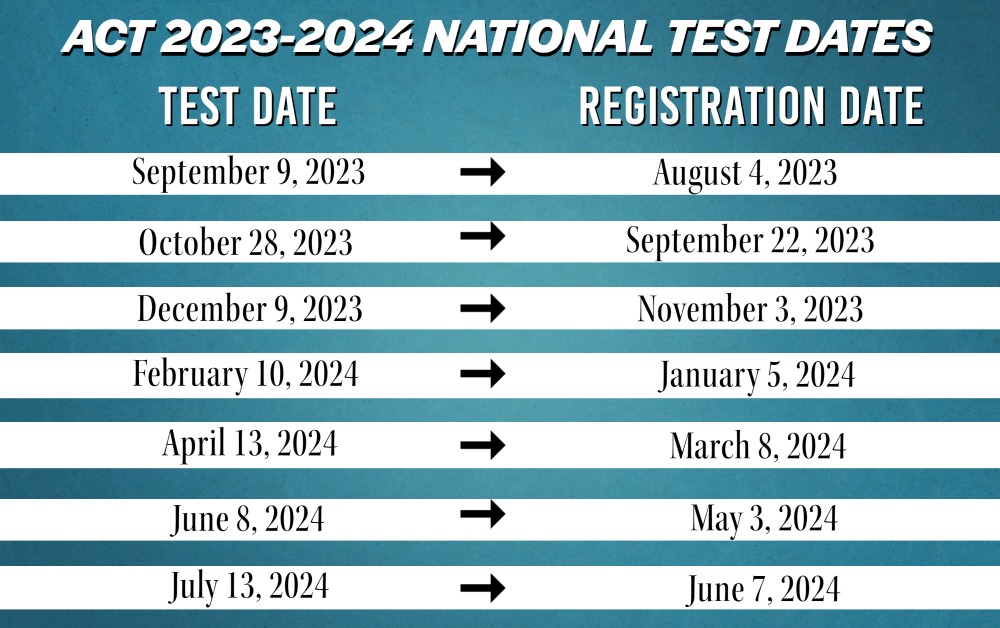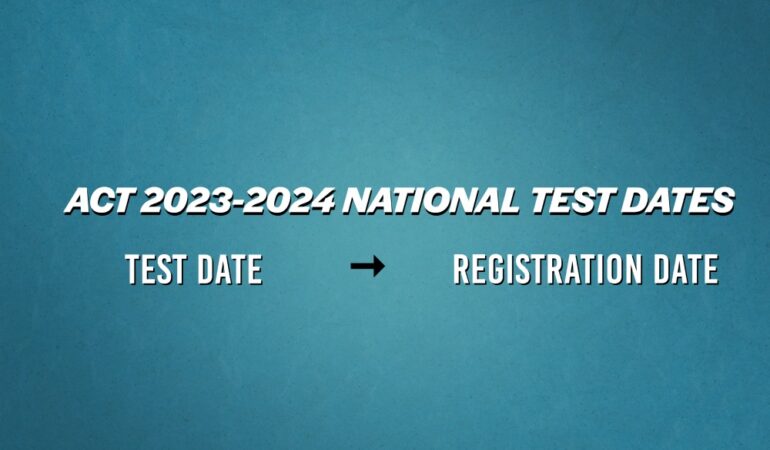The Struggles of a Shrinking ACT Score
The Struggles of a Shrinking Average ACT Score: Adverse Effects on College-Bound Students and how Test Prep Can Help.
The landscape of college admissions has recently seen a significant shift, with the average ACT score plummeting to 19.5. This change has brought about unforeseen challenges for students preparing to embark on their college journeys. While we’ll explore the adverse effects of this new norm on aspiring college students, we’ll also review the benefits of test preparation in more aspects than just the ACT.
Reduced Competitiveness:
With the average ACT score declining to 19.5, many students may feel that they need to work even harder to stand out in the increasingly competitive world of college admissions. Lower average scores could create the illusion that admissions have become less selective, pushing students to improve their applications and seek out additional extracurricular activities to compensate for lower scores.
Less Clear Benchmark:
Standardized tests like the ACT have traditionally provided a benchmark by which students could gauge their readiness for college. A lower average score can confuse students about what is considered a competitive score for their desired institutions, leading to increased uncertainty and stress during the application process.
Increased Reliance on Other Factors:
As standardized test scores become less prominent, colleges will likely place more emphasis on other factors like GPA (even inflated GPA), letters of recommendation, and extracurricular activities. While this may seem beneficial, it can also create a more significant burden on students to excel in these areas and make it even more challenging for them to differentiate themselves from their peers.
Impact on Scholarships and Financial Aid:
Scholarships and financial aid packages often consider standardized test scores when awarding funds. A lower average ACT score might result in fewer opportunities for merit-based aid. Students who could have qualified for financial assistance may find themselves with limited options due to the reduced importance of standardized test scores.
Educational Preparedness:
The lower average ACT score could be seen as an indication of declining educational preparedness. While the test’s validity has been questioned, it has historically aimed to assess students’ knowledge and readiness for college-level work. The lower average score might raise concerns about the quality of pre-college education.
Get Smarter Prep Students:
While the average ACT score continues to drop, students who have come through GSP for ACT prep have seen more than just an increase in their own ACT scores. When preparing for the ACT, students build knowledge in English, Math, Reading, and Science which in turn helps their overall ability to score better in their core subjects in high school. Overall, students are more likely to increase their high school math scores, write more affluent essays, and test more confidently since applying test taking strategies. With multiple options for ACT Prep including our ACT Prep Course, Semi-Private or Private Tutoring, Get Smarter Prep students have a much higher rate of increasing their ACT scores.
The new average ACT score of 19.5 reflects a changing landscape in college admissions. While it may ease the pressure on some students, it introduces a new set of challenges, especially for those who aspire to attend selective institutions or those who want to attain scholarships. Ultimately, a comprehensive approach to college admissions should consider not only standardized test scores but also a student’s entire academic journey, experiences, and potential to thrive in a college environment.
Planning Ahead
In a prior blog, we wrote about what we at GSP consider the Top 10 Test Prep Traps that students and parents can fall into. The first item on that list was “taking the test too early” – before the end of sophomore year. But, understandably, as many parents (and students!) find themselves overwhelmed with the whole junior and senior year process, parents vow to start earlier next time. “You’ll see!”, they think. “Davey will start preparing for the ACT in 7th grade!”
It sounds reasonable, at first. Planning ahead is a responsible thing to do. Taking one’s time with a project or task is generally more enjoyable than saving it until the very last minute, and there’s so much going on during junior year that it might feel like there’s not nearly enough time to do the necessary work.
The main reason we cited in our previous post for not beginning so early is that students generally haven’t had the necessary coursework tested by the ACT and SAT before the end of their sophomore year. But that isn’t the only reason. It’s also important to consider that the tests do change periodically – sometimes in small ways, sometimes via larger overhauls.
Practicing for the SAT years before taking it is akin to attempting to write college essays years in advance – not only is it unlikely that a student has the necessary experience and knowledge to be successful, it’s also nearly certain that the requirements will actually change, meaning that much (if not all) of that effort would be wasted.
We at GSP have had some conversations about this concept of “too early,” and how to answer the question, “but what should we do, then?”. Here are some tips and suggestions we’ve come up with for how younger students – and their parents – can best prepare for the standardized tests of the future.
1. READ!
Every tutor I spoke with listed reading as the number one thing students should focus on. Here’s what some of them said about the importance of developing good reading habits:
“Just read regularly. Can be books, news, magazines, or whatever. […] Most test taking strategies are about time use, but if you can’t understand what they’re saying then there’s little point.” – Logan Terry
“[Students should] read whatever they can get their hands on for reading comprehension, to see how proper punctuation and grammar are used, and to familiarize themselves with vocab words.” Madison Huber-Smith, former tutor
“The best thing a 7th grader can do to prepare for the ACT/SAT/PSAT/LSAT/MCAT/GMAT/LIFE is to read everything and anything. The more varied a kid’s reading experiences, the better prepared they are to do well on standardized tests. Reading is so important for every section of standardized tests — even math and science. […] Test prep works best for students who have a solid grasp of reading comprehension and the ability to make mental leaps from step A to B to C in a multi-step problem. All the test taking strategies in the world won’t help if you can’t understand the words you are reading and can’t problem solve. ” Gina Claypool
2. Encourage “a spirit of curiosity and learning.”
From Gina,: “Read with your kid. Discuss books, magazine and news articles (that way, you know if your kid is comprehending what they are reading), documentaries, etc. If your kid shows an interest in a subject you know nothing about, say “let’s learn about that together”. I’m kind of a nerd, but, in the summers before going to work, my mom would leave a logic puzzle for my sisters and me to solve, and I loved it. I think doing fun logic puzzles was a key factor in my enjoyment of math and science.”
3. Address difficulties with math as they arise.
It’s not unusual that students have forgotten some of the math they’ve learned by the time start preparing for the ACT and SAT – and that’s OK! Reviewing that content is part of what we do. But it’s more time-consuming to address math topics that a student didn’t really understand the first time around. Madison: “I have students complain that they had bad teachers for certain classes, and it affects them when it comes time to review for the ACT. A strong, early grasp of algebra is so key!”
4. Relax!
“Don’t worry about it too much. Do your homework, stay in school, and get involved in things that interest you. The ACT isn’t going to determine how successful you become. It’s just one of the first hoops you have to jump through in life.” – Caleb
Audrey Hazzard is a Tutor at Get Smarter Prep.
ACT Score Percentiles
The ACT is one of the most popular standardized tests in the country, and its scores are used by colleges and universities to determine whether you are eligible for admission. Once you receive your scores, you may be wondering how you compared to everyone else who took the ACT.
ACT percentile rankings are based on a simple calculation. When you take the ACT, your score is calculated against the scores of all other students who have taken the test at a given time. The lowest possible percentile rank is 1st, which means that you scored better than 99% of all test-takers. The highest possible percentage rank is 99th, which means that you scored better than 99% of all test-takers.
For example, let’s say you scored a 19 (a 19.8 is the national average) on your ACT. That typically means you did better than 53% of test-takers. A score of 28 would be better than 90% of all test-takers.
The chart below is a good visual to compare ACT Score National Ranks.

As a reminder, your ACT score and national rank are a piece of what colleges are looking at when you apply. Each college will be different and there are other factors as well such as GPA, challenging high school curriculum, extra-curriculars, leadership skills, well-written & thoughtful essays, demonstrated interest, letters of recommendation, etc. Get Smarter Prep has tutors available to help guide you through the process. Learn more about our College Counseling.
Not every student needs to score in the 30’s. Let’s say you are interested in attending University of Kansas. KU has an acceptance rate of 92%. Students that get into KU have an average ACT score of 21-29, which is between 64%-92%. Now let’s take a look at Northwestern University in Illinois. Their acceptance rate is 7% and students have an average ACT score of 34-35, which is in the 98-99% of the ACT National Percentages.
Regardless of where you are in the ACT Score National Ranks, we are here to help. Get Smarter Prep offers one-on-one, Private Tutorials as well as an ACT Prep Course for every ACT test date. Start preparing now. Look at your course load, your extra-curriculars and see when you can best fit in ACT prep. We can help you choose the right test date for you and help you put your best foot forward.
Preparation is the Key to Success
Preparation is the Key to Success
Whether you’re taking your ACT, SAT, AP tests or your History final, when it comes to education and testing, preparation is the key to success. Here are some ways to be prepared for any class or test:
1) Get organized.
Have a dedicated binder or folder for each class you are taking. File each class’ notes followed by the assignments related to that material. By keeping your school work organized, you will be able to refer back to your class notes and materials to review the concepts. When you finish your assignment, put it in the appropriate binder to avoid forgetting to take it with you.
It’s also a good idea to keep a calendar at the front of your binder with all your assignment due dates written down. For long term assignments, set a reminder to go off on your phone 2 weeks, 1 week and 3 days before the assignment is due to avoid procrastinating on the project.
2) Put pencil to paper.
While you’re in class, take notes. When you do your assignments, take notes and show your work. There’s no point in taking notes if you can’t understand them later.
3) Prepare your materials.
When you do your homework, find an uncluttered work surface, and organize your materials before you begin. Have a pencil (or two) and an eraser handy. Make sure your calculator batteries are working. Get some scratch paper.
4) Give yourself some time and some quiet.
I know you’re busy. Volunteer hours and extracurricular activities don’t leave as much time for homework as you might like. Write a homework appointment in your schedule, and don’t stand yourself up! By setting aside time for homework each day, you won’t overbook yourself. (Share your calendar with your parents, so they know not to schedule activities over your homework time).
When it’s time to do your assignments, turn off the TV. Silence your phone. Focusing on one thing at a time is a lost art in our multi-tasking, over-stimulated culture, but focusing on one task at a time and eliminating distractions makes you more efficient. Because we aren’t used to focusing on one thing for an extended period of time, this might be hard for you at first. Try this: set a timer for 15 minutes, and work diligently during that time. When the timer goes off, set another timer for 5 minutes, and take a break. Repeat. When focusing for 15 minutes gets easier, gradually increase the work time by five minute increments.
Since everyone has a different learning style, your best method of preparation might look a little different than this. You can learn what your learning style is and learn how to best apply that style to all your classes throughout high school (and on into college) with one of the many Study Skills Tests found online. Study skills like time management, organization, and homework planning will serve you throughout high school and college, and will even be great skills when you enter the work force. Study skills can also cover speed reading, reading comprehension, and writing skills.
For more information about Get Smarter Prep, contact one of our tutors.
Short-falls of Test Optional Policy
Short-falls of Test Optional Policy – Data Driven Approaches Benefit All Students
The newly popularized test optional policy seems super enticing to the average high schooler. No more testing anxiety, or stress over getting the highest score possible, or countless hours devoted to studying and taking practice tests. But despite the test optional policy’s appealing traits, the cons outweigh the pros. There are so many more reasons why standardized tests like the SAT and ACT are, ultimately, our best bet for creating a more equalized and fair college admissions process.
Objectivity
One of the biggest short-falls of the test optional policy is the lack of objectivity. The college admissions process has never been fully objective, but without an ACT or SAT score, universities are left to rely solely on extracurriculars, letters of recommendation, essays, and grades. Letters of recommendation and essays are great for measuring a student’s character, but don’t contribute as accurately to a measurement of a student’s academic readiness for university. And every high school has a different grading system, with different levels of grade inflation and deflation, and different classes offered. Many schools in lower-income areas, for example, don’t have the capacity or the demand to offer as many AP and honors courses as a school in a wealthier area. This affects measures of class rigor and GPA.
Extracurriculars are a difficult measurement as well- many after-school activities cost students and their families a lot of money. Sometimes this looks like spending thousands of dollars a year on sport costs, like a team or club fee, equipment, out-of-town tournaments, etc. But sometimes it is simply that a student spending hours after school playing a sport or acting in a musical or taking part in a science olympiad isn’t feasible due to familial responsibilities. Students might have to work to support their family, or babysit younger siblings. These are the kinds of things that interfere with a student’s ability to create the “perfect” college application. They are also things that wouldn’t necessarily hinder one’s ability to do well on the ACT or SAT.
Motive
Another one of the short-falls of the test optional policy is the issue of a lack of transparency in colleges’ and universities’ motives. When a school goes test optional, they are able to raise significantly their average ACT and SAT score ranges. You’ll see a school post that their average ACT range is 29-32, when in reality the average is much lower, but the students scoring lesser are simply going test optional. Higher scores make a school seem more elite, and thus desirable. This earns the university more applicants, resulting in a lower acceptance rate (and more money from application fees!), which furthers this cycle. Going test optional also makes the application process for the student seem a little more accessible.
Schools that someone might have never considered before due to low test scores are suddenly within reach. While there are obvious pros to this, the reality is that thousands of other applicants are thinking the same thing. Students begin applying to more and more schools, spending more money on applications and lowering more schools’ acceptance rates. It makes the entire process so much more competitive. While colleges love the test optional policy, it’s not because they love their students. As with most things in life, the test optional policy tends to benefit the systems, businesses, institutions, corporations, etc. and not a whole lot else.
The truth is that, despite the inevitable stress, standardized tests are really the lesser of college application evils. Through fee waivers, extended time options, tests hosted in schools, and grading on a curve, the testing companies work hard to provide equal access to everyone. And they only take up a few months of a student’s life, as opposed to the years that extracurriculars or clubs might consume. There are few options for completely standardized measures of academic readiness, and while we should always continue to look forward and keep improving, I don’t think we should cross off the ACT and SAT just yet.
Between Sophomore and Junior Year
The summer between sophomore and junior year is an important time for high school students to focus on their academic and personal growth. Here are some things that students should consider focusing on during this time:
Preparing for Standardized Tests:
Students should consider using the summer to prepare for standardized tests such as the ACT or SAT. This could include taking practice tests, which we highly recommend to establish a baseline score. Get Smarter Prep offers Free Practice Tests every Saturday morning. After establishing their score, we would recommend figuring out the best way to prepare for the test, which could include an ACT Prep Course, Semi-Private or Private Tutoring.
Exploring Career Interests:
The summer is a great time for students to explore their career interests. Students could participate in internships, job shadowing, or volunteer work in fields that interest them. Take this summer in particular to lean in and find out what you enjoy and what you want to steer clear from, since next summer students will most likely be busy taking college campus tours!
Building a Strong Academic Profile:
Students should aim to take challenging courses during their junior year, so the summer is a great time to prepare for these courses. This could include reading books related to the courses, taking online classes, or reviewing material from previous classes.
Developing Leadership Skills:
Students should consider getting involved in leadership roles during the summer. This could include volunteering for community service projects, participating in leadership programs, or starting a club or organization.
Pursuing Personal Interests:
The summer is also a great time for students to pursue personal interests that they may not have time for during the school year. This could include learning a new language, playing a musical instrument, or participating in sports. Also, make sure to relax and enjoy the summer. Go to the lake, hang out with friends and family or stay inside away from the heat and humidity to enjoy your favorite show.
Overall, the summer between sophomore and junior year is a time for students to focus on their personal and academic growth. By using this time wisely, students can set themselves up for success during their junior year and beyond.
ACT Test Dates for 2023-2024

Planning for the ACT is the key to success, which is why it’s important to know which test date is right for you. Test dates for 2023-2024 were released by ACT.org last week along with the regular registration deadline, late registration deadline + late fees, and the photo upload and standby deadline. As far as this summer, students still have the June 10th and July 15th test dates, which are great options for students with hectic schedules or a heavy academic load during the school year. Keep in mind, ACT Prep for the September 9th ACT will most likely begin mid-July.
Picking a Test Date
Choosing the right test date may seem overwhelming, but we are here to tell it’s not! Take a look at your academic load for the year and see where you can manage to add in test prep on top of your classes. Students will want to prioritize about 8-10 weeks prior to the chosen test date. Typically, students meet with their tutor once a week for an hour and a half sessions. Keep in mind, you will have about 2-3 hours of ACT homework to finish each week before your next tutoring session.
Now, let’s talk about extracurriculars. What sports are you involved in? Are you in the school play this year? Don’t start prepping for the ACT if you’re right in the middle of your season or preparing for your opening act! You will feel completely overwhelmed studying for the ACT on top of practices and games or rehearsals and you won’t be able to put your best foot forward towards the test. Wait until you are finished with extracurriculars to start preparing for the ACT.
We have multiple options to help you reach your goals including Private Tutoring, Semi-Private Tutoring or our ACT Prep Course. If you have no idea where to start with the process, we always recommend establishing a baseline score by taking a Free Practice Test at one of our locations.
If you need help figuring out which test date is best for you and how best to prepare for the test, please reach out to us.









